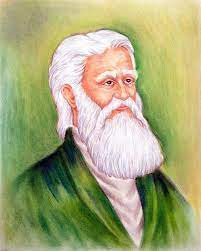Rahman Baba
Abdur Rahman baba was born in Peshawar in,1632 during the Mughal era in India. He is one of the four pillar Poets of Pashto poetry. The color of Sufism appears widely in his poetry. Historians of Pashto literature claim that the ancestors of Rahman baba belonged to Ghazni, Afghanistan but in the late 14th century, they migrated to modern-day Peshawar.
The life story of Rahman Baba is disputed among the historians but according to the major sources, Rahman Baba came from a wealthy and well-known landlord family but he preferred a simple lifestyle to luxury living. He himself had mentioned this fact many times in his poetry, as he says the wealthy may drink water from a golden cup but a clay bowl is a dearest to me. For his family he mentioned "An ascetic like me and wealthy like Aziz Khan(his brother), how are we even comparable"
The poetry of Rahman Baba has a great influence on the Pashto speakers of Pakistan and Afghanistan, as well as he is famous in Punjab and other parts of Pakistan as in KPK. The fact is that Rahman Baba is not only known for his poetry but also for his deep relation correlation with Sufism. The Sufi order of Rahman Baba is disputed but it is well known that he was one of the great Sufis to this day. He went so deep into Sufism that he never cared about anything else, historians claim that a major part of his writings was lost or never published because Rahman Baba never cared about it nor he was interested in writing, it is no less than a miracle that Pashto literature still holds a diwan of such a person's poetry.
The poetry collection(diwan) of Rahman Baba was published in 1728 A.D. and consists of 343 poems, which are written in native Pashto. A majority of Persian words can also be found in his poetry, as Persian was the most prominent language of his time. There are a total of 25 original classic manuscripts of his diwan, scattered in various parts of the world. Ten of the 25 original manuscripts are in Pashto Academy Peshawar while the others are distributed in other libraries of the world, mainly British and French because, during the British rule in India, most of the historical masterpieces of India were transported to Great Britain including Rahman Baba's diwan. Later in 1877, the diwan for the first time was printed by Anglican Missionary T.P. Hughes in Lahore, the modern-day copies of the diwan all originate from the 1877 printed version.
Today the Rahman Baba writings are not only limited to Pashto. In 2009, 111 verses were translated into English rhyme and were published by Arbab Hidayatullah as well as the native Pashto version of the diwan has also been translated into Roman Alphabets, to make it easier for modern readers to understand it.
Rahman Baba has received high praise in Afghanistan and Pakistan. In his memory, railway stations, national parks, and schools are named after him. The Government of Khyber Pukhtoon Khwa also launched a postal stamp, with a name and picture of Rahman Baba. Along with Khushal Khan, Ameer Hamza, and Ghani Kahn, Rahman Baba is counted as the main pillar of Pashto Poetry.






0 Comments